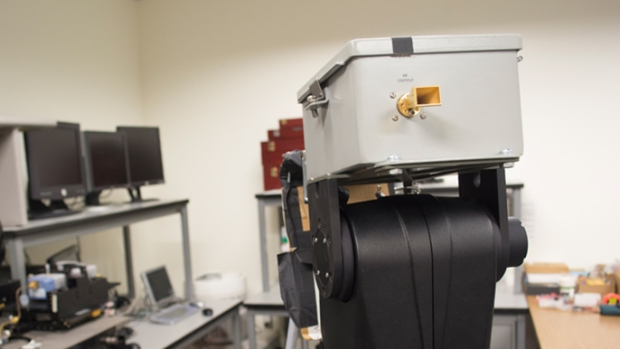NYU Wireless at NYU Tandon releases NYUSIM 4.0 to accelerate standardization efforts of 6G wireless communications

Sliding correlation channel sounder used to develop channel models for NYUSIM 4.0
NYU WIRELESS, a leading research center in wireless communications at the New York University Tandon School of Engineering, today announced the launch of NYUSIM 4.0, the world's first wireless channel simulator capable of generating real-world wireless channels above 100 GHz.
NYUSIM 4.0 is a groundbreaking open-source sub-THz and mmWave wireless channel simulator developed in MATLAB that is free to download and use by global industrial and academic institutions. The first three versions of NYUSIM have been downloaded over 100,000 times since the release of NYUSIM 1.0 in 2016.
NYUSIM 4.0 is specifically designed to help accelerate the standardization efforts for 6G wireless communications, which is expected to kick off in 2025.
"The release of NYUSIM 4.0 marks a significant milestone in the development of wireless communication technologies,” said Professor Ted Rappaport, the founder of NYU WIRELESS. “It empowers researchers and engineers across the globe with a powerful tool for designing wireless systems that can operate above 100 GHz, a frequency range that has long been considered challenging due to its unique propagation characteristics. It brings the promise of paving the way for more efficient and reliable wireless communication technologies that will transform industries and benefit society as a whole."
NYUSIM 4.0 comes with a myriad of new features that allow for the simulation of wireless channels in various scenarios, including urban microcell (UMi), urban macrocell (UMa), rural macrocell (RMa), indoor hotspot (InH), and indoor factory (InF) environments.
The simulator offers indoor and outdoor channel models for each scenario, supporting carrier frequencies ranging from 0.5 to 150 GHz with an RF bandwidth from 0 Hz (CW) to 1 GHz. The inclusion of drop-based and spatial-consistency-based channel simulations for all five simulation scenarios further enhances the simulator's capabilities.
NYU WIRELESS represents one of NYU Tandon’s core “Areas of Excellence,” the interdisciplinary framework that organizes the institution’s research and teaching priorities. The Center’s work aims to accelerate the development and deployment of wireless technologies that can have a transformative impact on various sectors including healthcare, transportation, entertainment, and beyond. It brings together faculty and students from engineering, computer science, and mathematics to work on cutting-edge research in areas including 6G and beyond, millimeter-wave wireless communications, internet of things, and machine learning for wireless networks. NYU Wireless has collaborations with industry partners, government agencies, and other academic institutions.
NYUSIM 4.0 is available for free download wireless.engineering.nyu.edu/nyusim.
About the New York University Tandon School of Engineering
The NYU Tandon School of Engineering is home to a community of renowned faculty and undergraduate and graduate students united in a mission to understand and create technology that powers cities, enables worldwide communication, fights climate change, and builds healthier, safer, and more equitable real and digital worlds. The school’s culture centers on encouraging rigorous, interdisciplinary collaboration and research; fostering inclusivity, entrepreneurial thinking, and diverse perspectives; and creating innovative and accessible pathways for lifelong learning in STEM, from K12 through executive education and new advances in digital learning.
NYU Tandon dates back to 1854, the founding year of both the New York University School of Civil Engineering and Architecture and the Brooklyn Collegiate and Polytechnic Institute. Those institutions evolved independently before merging in 2014 to create what is now known as NYU Tandon. Located in the heart of Brooklyn, NYU Tandon is a vital part of NYU's New York campus and unparalleled global network. For more information, visit engineering.nyu.edu.

